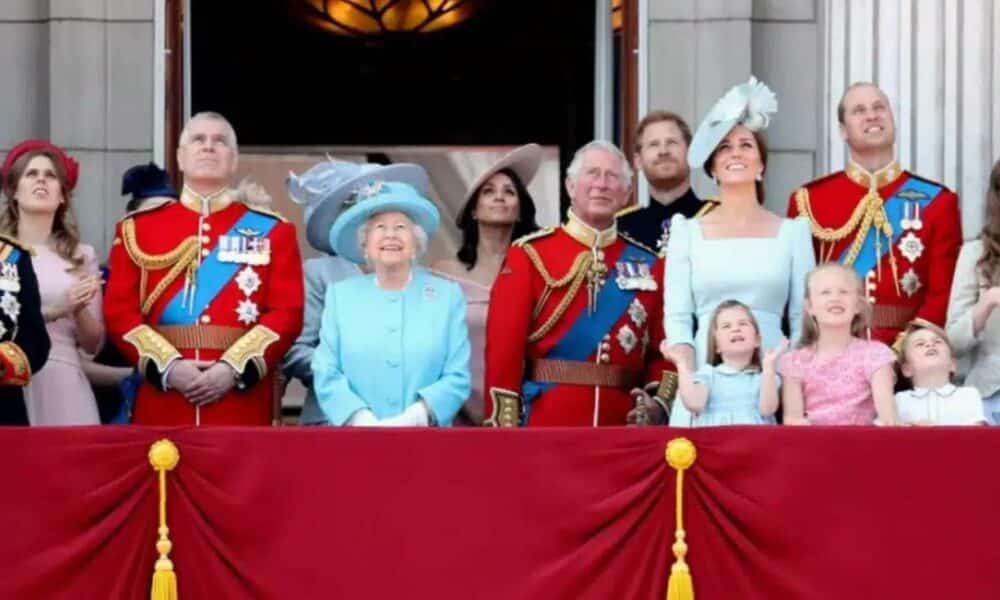British Royal Family Celebrates New Heir and Changes in the Line of Succession
The British Royal Family is celebrating a significant moment with the birth of Athena Elizabeth Rose, the daughter of Princess Beatrice and Edoardo Mapelli Mozzi. The baby was born on January 22, 2025, at 12:57 PM at the Chelsea and Westminster Hospital in London, one of the most prestigious hospitals in the country. The birth occurred earlier than expected, classifying Athena as premature, with a weight of approximately 2 kg. Despite the early arrival, both mother and daughter received specialized care and are in good health, according to the medical team and the royal family. The arrival of the new member strengthens the monarchy’s lineage and causes changes in the line of succession, placing Athena in 11th position, right after her older sister, Sienna Elizabeth Mapelli Mozzi.
The choice of name for the newborn carries deep symbolism. Athena refers to the Greek goddess of wisdom, a name that signifies strength and intelligence. Elizabeth is a direct tribute to Queen Elizabeth II, Beatrice’s grandmother, who passed away in September 2022. Rose completes the name in a traditional and elegant manner, being a classic name among the British. The tradition of honoring significant royal family members through names remains a common practice among the monarchy’s descendants.
Athena’s arrival was met with great enthusiasm by the royal family, who publicly celebrated the birth. King Charles III and Queen Camilla sent their congratulations, as did other royal members, including Prince William and Kate Middleton. Sarah Ferguson, Beatrice’s mother, expressed her joy in welcoming her granddaughter, emphasizing the positive impact of the new generation on the continuity of the British monarchy.
Changes in the Line of Succession and Impact on the British Monarchy
The birth of Athena Elizabeth Rose alters the line of succession to the British throne. She now occupies the 11th position, behind her older sister, Sienna, and her mother, Princess Beatrice. Although far from the crown, Athena reinforces the presence of new heirs within the monarchy and brings greater stability to the royal lineage.
The order of succession to the throne follows laws established centuries ago but was modified in 2013 with the Crown Succession Act. Previously, male heirs were given preference over their older sisters. However, the new law established absolute primogeniture, ensuring that the line of succession follows the order of birth regardless of gender. This change allowed princesses like Charlotte, daughter of Prince William, to maintain their positions in the line of succession even with the birth of younger brothers.
The British monarchy has historically viewed each birth within the royal family as a reinforcement of institutional continuity. The arrival of new members, especially direct descendants of Queen Elizabeth II, maintains the relevance of the royal family in the UK’s political and social landscape. Although Athena and her sister may not play central roles in the monarchy, their presence reinforces the stability and tradition of the British royal system.

History of Premature Births in the British Royal Family
Athena is not the first baby in the British royal family to be born prematurely. Over the years, several royals have faced similar challenges, receiving intensive medical care to ensure their health. One notable case is that of Prince Edward, the youngest son of Queen Elizabeth II, who was born slightly earlier than expected in 1964.
Athena’s premature birth highlights the importance of rigorous medical monitoring for royal family members. The Chelsea and Westminster Hospital, where she was born, has provided care to other prominent royal figures. With an advanced structure for high-risk births, the hospital offers some of the best neonatal care in the UK.
The Significance of the Name and the Royal Tradition of Tributes
The choice of Athena Elizabeth Rose reflects a balance between tradition and modernity in the British monarchy. The name Athena is rooted in Greek mythology and symbolizes wisdom, strategy, and courage. This aligns with the royal family’s tendency to choose names with profound meanings that convey essential values.
The name Elizabeth appears in multiple descendants of Queen Elizabeth II as a tribute to the monarch, who led the UK for over 70 years. A prime example is Princess Charlotte Elizabeth Diana, daughter of Prince William and Kate Middleton, who carries the names of her great-grandmother and her paternal grandmother, Princess Diana.
Additionally, the inclusion of the name Rose follows a British tradition of floral names, often chosen to symbolize delicacy and continuity. Other royals, such as Lady Rose Windsor, also bear this name, reinforcing its historical connection to British culture.
Princess Beatrice’s Role in the Royal Family and Her Private Life
Princess Beatrice is known for maintaining a reserved stance regarding royal activities. Unlike other members of the royal family, she has focused on her family life and philanthropic endeavors. Married to Edoardo Mapelli Mozzi since 2020, Beatrice has balanced her personal life with the responsibility of representing the royal family at formal events.
Beatrice is also the stepmother of Christopher Woolf, known as Wolfie, Edoardo’s son from a previous relationship. The relationship between Beatrice and Wolfie has always been portrayed as close and affectionate, showcasing her dedication to family life.
Over the years, the princess has been involved in various social initiatives, supporting causes related to education and accessibility for individuals with learning difficulties. Her discreet yet committed approach to her family and charitable work has made her a respected figure within the monarchy.
The Role of New Generations in the Continuity of the British Monarchy
Athena’s arrival marks a new chapter for the British monarchy, which is undergoing a transition phase following the passing of Queen Elizabeth II. The presence of new generations is essential for maintaining the monarchy’s relevance in the UK and internationally.
The royal family has been adapting to social changes, striving to balance tradition and modernity. With figures like Prince William and Kate Middleton taking on more prominent roles, it is expected that new generations, including Athena and her sister Sienna, will continue to represent the monarchy in the future.
The British monarchy has always relied on the strength of tradition to remain relevant. The birth of Athena reinforces this lineage’s continuity and symbolizes the royal family’s commitment to its role in British society.
Curiosities About the Royal Family and the Line of Succession
- King Charles III, the current British monarch, is the firstborn son of Queen Elizabeth II and has been on the throne since September 2022.
- The British royal family’s line of succession currently includes more than 20 members.
- Princess Beatrice was the first granddaughter of Queen Elizabeth II to marry in a private ceremony inside Windsor Castle.
- The name Elizabeth has been used by multiple queens and princesses throughout British history, making it one of the most traditional royal names.
- The Chelsea and Westminster Hospital is one of the UK’s most prestigious hospitals, frequently used by royal family members for medical care.
The Impact of Athena’s Birth on the Monarchy
The birth of Athena Elizabeth Rose represents more than just an addition to the royal family. It reinforces the monarchy’s traditions and ensures the continuity of the British royal lineage. The presence of new generations strengthens the monarchy’s identity and guarantees its permanence as a fundamental institution in the United Kingdom. With the history and tradition that the royal family carries, each new birth becomes a significant milestone in the monarchy’s trajectory.

The British Royal Family is celebrating a significant moment with the birth of Athena Elizabeth Rose, the daughter of Princess Beatrice and Edoardo Mapelli Mozzi. The baby was born on January 22, 2025, at 12:57 PM at the Chelsea and Westminster Hospital in London, one of the most prestigious hospitals in the country. The birth occurred earlier than expected, classifying Athena as premature, with a weight of approximately 2 kg. Despite the early arrival, both mother and daughter received specialized care and are in good health, according to the medical team and the royal family. The arrival of the new member strengthens the monarchy’s lineage and causes changes in the line of succession, placing Athena in 11th position, right after her older sister, Sienna Elizabeth Mapelli Mozzi.
The choice of name for the newborn carries deep symbolism. Athena refers to the Greek goddess of wisdom, a name that signifies strength and intelligence. Elizabeth is a direct tribute to Queen Elizabeth II, Beatrice’s grandmother, who passed away in September 2022. Rose completes the name in a traditional and elegant manner, being a classic name among the British. The tradition of honoring significant royal family members through names remains a common practice among the monarchy’s descendants.
Athena’s arrival was met with great enthusiasm by the royal family, who publicly celebrated the birth. King Charles III and Queen Camilla sent their congratulations, as did other royal members, including Prince William and Kate Middleton. Sarah Ferguson, Beatrice’s mother, expressed her joy in welcoming her granddaughter, emphasizing the positive impact of the new generation on the continuity of the British monarchy.
Changes in the Line of Succession and Impact on the British Monarchy
The birth of Athena Elizabeth Rose alters the line of succession to the British throne. She now occupies the 11th position, behind her older sister, Sienna, and her mother, Princess Beatrice. Although far from the crown, Athena reinforces the presence of new heirs within the monarchy and brings greater stability to the royal lineage.
The order of succession to the throne follows laws established centuries ago but was modified in 2013 with the Crown Succession Act. Previously, male heirs were given preference over their older sisters. However, the new law established absolute primogeniture, ensuring that the line of succession follows the order of birth regardless of gender. This change allowed princesses like Charlotte, daughter of Prince William, to maintain their positions in the line of succession even with the birth of younger brothers.
The British monarchy has historically viewed each birth within the royal family as a reinforcement of institutional continuity. The arrival of new members, especially direct descendants of Queen Elizabeth II, maintains the relevance of the royal family in the UK’s political and social landscape. Although Athena and her sister may not play central roles in the monarchy, their presence reinforces the stability and tradition of the British royal system.

History of Premature Births in the British Royal Family
Athena is not the first baby in the British royal family to be born prematurely. Over the years, several royals have faced similar challenges, receiving intensive medical care to ensure their health. One notable case is that of Prince Edward, the youngest son of Queen Elizabeth II, who was born slightly earlier than expected in 1964.
Athena’s premature birth highlights the importance of rigorous medical monitoring for royal family members. The Chelsea and Westminster Hospital, where she was born, has provided care to other prominent royal figures. With an advanced structure for high-risk births, the hospital offers some of the best neonatal care in the UK.
The Significance of the Name and the Royal Tradition of Tributes
The choice of Athena Elizabeth Rose reflects a balance between tradition and modernity in the British monarchy. The name Athena is rooted in Greek mythology and symbolizes wisdom, strategy, and courage. This aligns with the royal family’s tendency to choose names with profound meanings that convey essential values.
The name Elizabeth appears in multiple descendants of Queen Elizabeth II as a tribute to the monarch, who led the UK for over 70 years. A prime example is Princess Charlotte Elizabeth Diana, daughter of Prince William and Kate Middleton, who carries the names of her great-grandmother and her paternal grandmother, Princess Diana.
Additionally, the inclusion of the name Rose follows a British tradition of floral names, often chosen to symbolize delicacy and continuity. Other royals, such as Lady Rose Windsor, also bear this name, reinforcing its historical connection to British culture.
Princess Beatrice’s Role in the Royal Family and Her Private Life
Princess Beatrice is known for maintaining a reserved stance regarding royal activities. Unlike other members of the royal family, she has focused on her family life and philanthropic endeavors. Married to Edoardo Mapelli Mozzi since 2020, Beatrice has balanced her personal life with the responsibility of representing the royal family at formal events.
Beatrice is also the stepmother of Christopher Woolf, known as Wolfie, Edoardo’s son from a previous relationship. The relationship between Beatrice and Wolfie has always been portrayed as close and affectionate, showcasing her dedication to family life.
Over the years, the princess has been involved in various social initiatives, supporting causes related to education and accessibility for individuals with learning difficulties. Her discreet yet committed approach to her family and charitable work has made her a respected figure within the monarchy.
The Role of New Generations in the Continuity of the British Monarchy
Athena’s arrival marks a new chapter for the British monarchy, which is undergoing a transition phase following the passing of Queen Elizabeth II. The presence of new generations is essential for maintaining the monarchy’s relevance in the UK and internationally.
The royal family has been adapting to social changes, striving to balance tradition and modernity. With figures like Prince William and Kate Middleton taking on more prominent roles, it is expected that new generations, including Athena and her sister Sienna, will continue to represent the monarchy in the future.
The British monarchy has always relied on the strength of tradition to remain relevant. The birth of Athena reinforces this lineage’s continuity and symbolizes the royal family’s commitment to its role in British society.
Curiosities About the Royal Family and the Line of Succession
- King Charles III, the current British monarch, is the firstborn son of Queen Elizabeth II and has been on the throne since September 2022.
- The British royal family’s line of succession currently includes more than 20 members.
- Princess Beatrice was the first granddaughter of Queen Elizabeth II to marry in a private ceremony inside Windsor Castle.
- The name Elizabeth has been used by multiple queens and princesses throughout British history, making it one of the most traditional royal names.
- The Chelsea and Westminster Hospital is one of the UK’s most prestigious hospitals, frequently used by royal family members for medical care.
The Impact of Athena’s Birth on the Monarchy
The birth of Athena Elizabeth Rose represents more than just an addition to the royal family. It reinforces the monarchy’s traditions and ensures the continuity of the British royal lineage. The presence of new generations strengthens the monarchy’s identity and guarantees its permanence as a fundamental institution in the United Kingdom. With the history and tradition that the royal family carries, each new birth becomes a significant milestone in the monarchy’s trajectory.











Post Comment